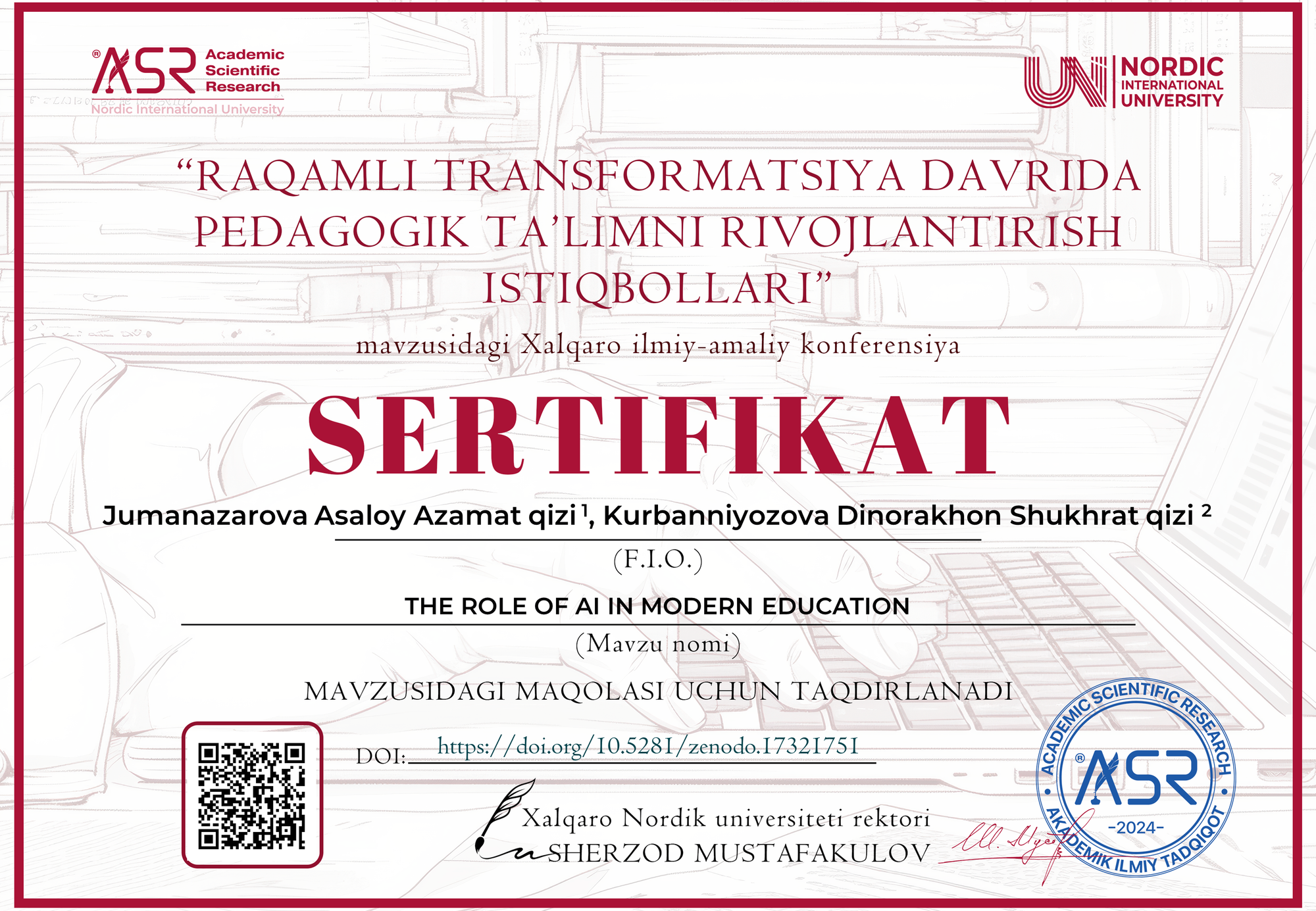Jumanazarova Asaloy Azamat qizi 1, Kurbanniyozova Dinorakhon Shukhrat qizi 2

DOI: https://doi.org/10.5281/zenodo.17321751
Google scholar:
Zenodo community: https://zenodo.org/records/17321751
Nordic_press journal: https://research.nordicuniversity.org/index.php/nordic/issue/view/14
MAQOLANI YUKLAB OLISH
SERTIFIKATNI YUKLAB OLISH
REVIEW:
The article “The Role of AI in Modern Education” by Jumanazarova Asaloy Azamat qizi and Kurbanniyozova Dinorakhon Shukhrat qizi presents a comprehensive discussion on how artificial intelligence is transforming modern educational practices. The authors successfully highlight both the opportunities and the challenges associated with AI integration in teaching and learning environments.
The paper’s relevance is beyond question, as the digitalization of education and the global spread of AI-based tools have become one of the most pressing issues in 21st-century pedagogy. The authors skillfully emphasize the dual nature of this transformation: on one hand, AI offers personalization, automation, and accessibility; on the other, it introduces ethical, financial, and psychological challenges that require critical analysis.
From a methodological standpoint, the study adopts a descriptive qualitative approach, making use of secondary data such as books, journals, and official online sources. This approach is appropriate for a conceptual study of emerging technologies, as it allows the authors to synthesize diverse viewpoints and identify major trends in AI-based education. The structure of the article — including sections on benefits, challenges, and future prospects — ensures logical coherence and readability.
The content analysis effectively captures the main areas where AI contributes to educational innovation: personalized learning, automated grading, and student engagement. The discussion on “personalized learning” is particularly well-developed, demonstrating how AI can adapt instruction to individual students’ needs, pace, and learning styles. The authors convincingly argue that such adaptive learning systems increase motivation and improve outcomes — a claim supported by current educational technology research.
Equally valuable is the authors’ attention to ethical and institutional challenges. By addressing privacy, cost, and fairness, they acknowledge that the success of AI in education depends not only on technology but also on human and organizational readiness. The paper rightly stresses the importance of building trust between learners and AI systems — an aspect often overlooked in similar studies.
However, the article could benefit from deeper analytical interpretation and more specific examples of AI applications (such as ChatGPT, adaptive testing platforms, or AI-driven plagiarism detection tools). Incorporating comparative data or case studies from real educational institutions would strengthen the argument and demonstrate practical relevance.
In its conclusion, the authors summarize the dual nature of AI’s role in modern education with clarity and balance, recognizing both its potential and its limitations. The call for careful integration of AI tools while safeguarding students’ privacy and equity is timely and well-grounded.
Overall, this research paper makes a meaningful contribution to the discourse on digital pedagogy. It reflects a good understanding of both pedagogical theory and technological innovation, offering valuable insights for students, educators, and policymakers interested in the future of education.
✅ Overall Evaluation:
Scientific relevance: High
Structure and clarity: Good
Language and style: Clear, academic
Practical significance: Considerable
Recommendation: Recommended for publication with minor stylistic and analytical improvements.



